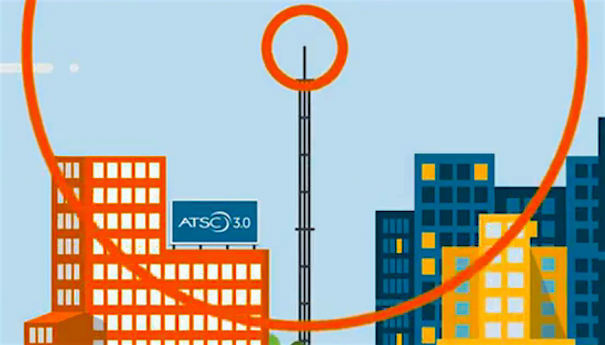NAB Calls TV White Spaces Effort a "Google Glass-Level Disappointment"
Was in response to Microsoft asking the FCC reconsider its January decision to allow DTS single frequency networks for ATSC 3.0

The professional video industry's #1 source for news, trends and product and tech information. Sign up below.
You are now subscribed
Your newsletter sign-up was successful
WASHINGTON D.C.—A blog post by NAB deputy general counsel Patrick McFadden has blasted Microsoft's efforts to get the FCC to revise a January ruling that would have made it easier for broadcasters to deploy ATSC 3.0 services and improve the viewing experience with Next Generation TV technologies.
The controversy revolves around FCC January 13 Report and Order updating its DTS (distributed transmission system) coverage rules.
The order expanded the permissible range of signal spillover and replaced the subjective “minimal amount” language used to describe spillovers, giving broadcasters more flexibility in the placement of DTS transmitters and would help ATSC 3.0 reaching its full potential.
In a May 21 filing with the FCC, Microsoft detailed a number of complaints about the order and argued the order would hurt their Airband Initiative to use TV white spaces to provide broadband services in rural areas. It "needlessly worsens an already-difficult environment" for TV white spaces deployments, the filing noted.
"The DTS Order was an unfortunate misstep," the filing concluded. "We encourage the Commission to instead adopt a streamlined waiver approach like that proposed by Acting Chairwoman Rosenworcel and Commissioner Starks to provide broadcasters any increased efficiency and flexibility they need for legitimate DTS spillover, avoiding the DTS Order’s significant and unnecessary restriction on the availability of TVWS services."
In his blog, McFadden criticized Microsoft's “Airband Initiative,” as a heavily hyped solution to the rural broadband gap that has not lived up to its promises.
"Initiative relies heavily on unlicensed use of unoccupied channels in the television band, known as TV `white spaces,'" McFadden wrote. "Almost 10 years after the Federal Communications Commission (FCC) initially authorized white spaces operations, the technology was a Google Glass-level disappointment. There were only approximately 800 white spaces devices – yes, only 800 – operating across the entire country and promises of `Super Wi-Fi' or `gigabit speeds' spurring billions of dollars of investment were empty."
The professional video industry's #1 source for news, trends and product and tech information. Sign up below.
Despite this lack of success, McFadden complained that Microsoft is now using the Airband Initiative to "overturn rules the Commission recently adopted to further the deployment of Next Generation TV services and improve service to television viewers, effectively constraining broadcasters from offering services broadcasters are actually currently deploying to protect Microsoft’s ability to offer theoretical services."
George Winslow is the senior content producer for TV Tech. He has written about the television, media and technology industries for nearly 30 years for such publications as Broadcasting & Cable, Multichannel News and TV Tech. Over the years, he has edited a number of magazines, including Multichannel News International and World Screen, and moderated panels at such major industry events as NAB and MIP TV. He has published two books and dozens of encyclopedia articles on such subjects as the media, New York City history and economics.

